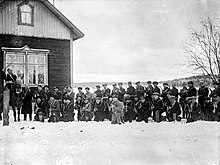Revolutionary movement

A revolutionary movement (or revolutionary social movement) is a specific type of social movement dedicated to carrying out a revolution. Charles Tilly defines it as "a social movement advancing exclusive competing claims to control of the state, or some segment of it".[1] Jeff Goodwin and James M. Jasper define it more simply (and consistently with other works[2][need quotation to verify]) as "a social movement that seeks, as minimum, to overthrow the government or state".[3]
A social movement may want to make various reforms and to gain some control of the state, but as long as they do not aim for an exclusive control, its members are not revolutionary.[4] Social movements may become more radical and revolutionary, or vice versa - revolutionary movements can scale down their demands and agree to share powers with others, becoming a run-of-the-mill political party.[4]
Goodwin distinguishes between a
An example of a conservative movement would be the
]The same social movement may be viewed differently depending on a given context (usually the government of the country where it unfolds).
A revolutionary movement can be
Five crucial factors to the development and success of a revolutionary movements include:[6]
- mass discontent leading to popular uprisings
- dissident political movements with élite participation
- strong and unifying motivations across major parts of the society
- a significant political crisis affecting the state - reducing state ability or will to deal with the opposition (see political opportunity)
- external support (or at last, lack of interference on behalf of the state)
See also
References
- ISBN 0-631-19903-9.
- ISBN 978-0-495-80440-6.
- ISBN 978-1-4051-8764-0.
- ^ ISBN 978-0-521-62948-5.
- ISBN 978-0-521-62948-5.
- ^ ISBN 978-0-8133-4515-4.
- ^ ISBN 978-0-8476-9106-7.
- ISBN 978-0-7619-2688-7.
